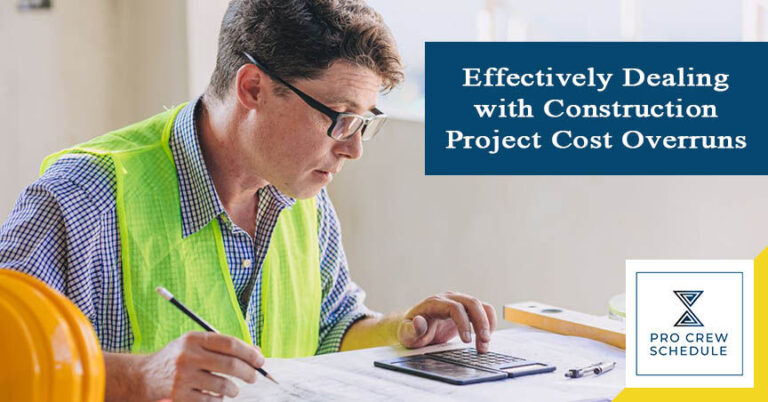Even though it is sad to say, project cost overruns are a normal part of managing construction, no matter how much preparation or organization you do. For a job to succeed, costs must stay within budget. If the job costs more than planned, the work may not be done on time or to the required standard. However, there are plenty of ways to account for these project overruns and reduce their effect on your company’s cash flow and profitability. Efficient cost management, good project planning, and effective use and allocation of resources can help keep your projects within budget.
Construction projects comprise a million moving parts, and you might run into project risks that make it harder for your company to grow. It is easy to say that you will stick to a tight budget. Keeping prices low can feel like a game of whack-a-mole because prices can increase due to unforeseen circumstances that are out of our control. In this article, let us look at the definition of project cost overruns, its common causes, and how to handle them.
What Is A Construction Project Cost Overrun?
A cost overrun is any extra cost that makes a job cost more than planned. Clients and other people involved in a project often agree on the budget before it starts. However, certain circumstances can affect the actual costs of resources or services, making it much higher than anticipated. It can be due to price increases, change orders, or additional fees. These extra costs should have been planned for, and not forecasting them can cause the job to cost more than planned.
How Do Construction Project Costs Get Out of Hand?
As mentioned earlier, it is not uncommon for project costs to go over budget, especially in construction projects. As a general contractor or a project manager, you should always be on the lookout for cost overruns and other things that can cause the project to cost more than planned. Besides this, you should also keep an eye on the project’s time, size, risk, and quality.
Many things can cause construction projects to go over budget, but these are the ones that happen most often. In this section, let us look at the common causes of project overruns.
Inaccurate Cost Estimates
Before a project even begins, the first step that you should do is to lay out your scope, schedule, and cost baselines. Everyone should know how much a construction budget will likely cost before you set your budget. This is why cost assessment is critical in ensuring you stay within budget. Try to evaluate past data; you can use it as a benchmark in forecasting your cost estimates and to help you accurately determine how much the job will cost.
Scope Creep
Scope creep can happen if you cannot clarify the project’s goals. Simply put, this means that additional jobs will appear out of nowhere during the execution process. In return, costs increase when you add jobs not planned for or considered in the original budget. This makes it likely that you will go over your project budget and cause prices to go up.
Poor Risk Management
Many things could go wrong with any job. It is up to the project manager and the project management team to make a risk management plan. This plan should include all the possible risks and the steps that can be taken to lower those risks if they happen.
Not having a risk management plan could cause problems with your project that you did not expect. This could make costs go up and the project go over budget.
Unforeseen Circumstances
Inclement weather, such as hurricanes, snowstorms, and even regular summer thunderstorms, can stop your project and make it more challenging to continue. These things are out of your hands and are difficult to forecast. You can add a contingency to account for these items, but it can still be hard to predict.
Lack of Communication
When you work on a project with a group, you need to talk to each other. Those who pay for, work on, and have clients in a project must all be on the same page with you. The project plan could change at the last minute if people do not talk to each other. Otherwise, there could be other issues that raise costs.
What Happens When Construction Project Costs Go Up?
Unexpected costs can make a project cost go up than what was planned. There are a lot of things that could happen when construction costs go up. In this section, let us look at the consequences of overruns.
Over Budget
Costs will rise above your budget, which means you will go over your budget. The ROI (return on investment) is lower, reducing your company’s profits. You might work in a deficit due to all the additional costs.
Delays
Costs that are too high can also make projects run late. The due dates for many projects get pushed back, resulting in more costs to account for the prolonged periods, such as labor and other services.
Claims
There are fights and claims. When costs exceed budget, it impacts the ROI and the profit margin. This could lead to a battle between the owner of the project and the building company. People who own projects often claim to get extra costs or losses paid for. Usually, these disagreements and claims cannot be solved quietly between the parties and are taken to court to be settled by a judge. A lot of money and your company’s reputation may be on the line.
How To Deal With Construction Projects That Go Over Budget
While cost overruns may seem inevitable, many ways exist to reduce their effect on the project and your company. In this section, check out these tips to lessen the harmful effects as much as possible.
Communicate With Your Clients
Once you spot the possible overrun, you must immediately tell the client and other relevant parties if the budget needs correcting. Be clear and direct with the client about what happened and what went wrong, and then explain how you plan to handle the raised project costs.
Update Your Stakeholders
Partners and project managers will always be on time if they can talk to each other easily. Too long a wait time can cost too much and start the wrong job at the wrong time. This extra time could make the whole project go off track.
Teams and stakeholders need to share knowledge and talk to each other correctly. For partners to ensure the project goes as planned, they need to know the big picture.
Try To Stick To The Project’s Scope
It is critical to ensure that all project parts are considered during the start to prevent additional change orders. Team members, clients, or business partners can give these other works. While many ideas could help the project, too many changes can slow the work and raise costs. Think about the big picture before you add more pieces to a job.
Document Any Change Orders
Change orders are one of the standard drivers of cost overruns, and these need to be agreed upon by all parties before they can proceed. Document the change order and explain in detail the answer that was agreed upon. Both sides should sign it.
Thorough and Meticulous Planning
Before you start any job, you should plan for cost overruns. If you make accurate and thorough predictions, you will be more likely to stick to your budget. It would help if you used facts from the past, conversations, and your own experience to plan a project. Please work with your stakeholders to get valuable insights on everything that could go wrong and look for the best ways to prevent it. Ensure that everyone with a stake in the project signs the plan when it is done to manage expectations.
Get To Know Your Trade Partners
For many jobs, you need to hire outside help to do certain chores or provide materials and tools. You may need to hire specialized subcontractors to do a specific job or work with a supplier to provide specialty materials. Sometimes, when you hire someone from outside your company, the project costs can go up for no reason. Building a solid network of trade partners is critical so you can take advantage of their partnering strategies.
Keep A Close Eye On Your Project’s Progress
Having a good overview of what is happening with your project lets you spot any potential problem immediately. Problems can be fixed before they get so bad that they hurt the project’s budget and plan. It offers valuable insights that show how the project is going, how much work the team has to do, and how long it will take to finish compared to the original plan. It also shows how long it will take to complete if things go wrong.
Reallocate Resources
If you find a job costing more than planned, you should reallocate resources to fix the issue. That could happen, but you can be ready by determining where your help will work best. This could prevent any delays and work stoppages on site.
Utilize Construction Technology
A good tool will certainly ease the work of a project manager, help the project get more done, and run more smoothly. Technology like construction management software can help make sure that costs stay within the plan and ensure that it is progressing on schedule. This technology can be accessed in the office or on the field, bridging the communication between teams and ensuring everyone is on the same page.







